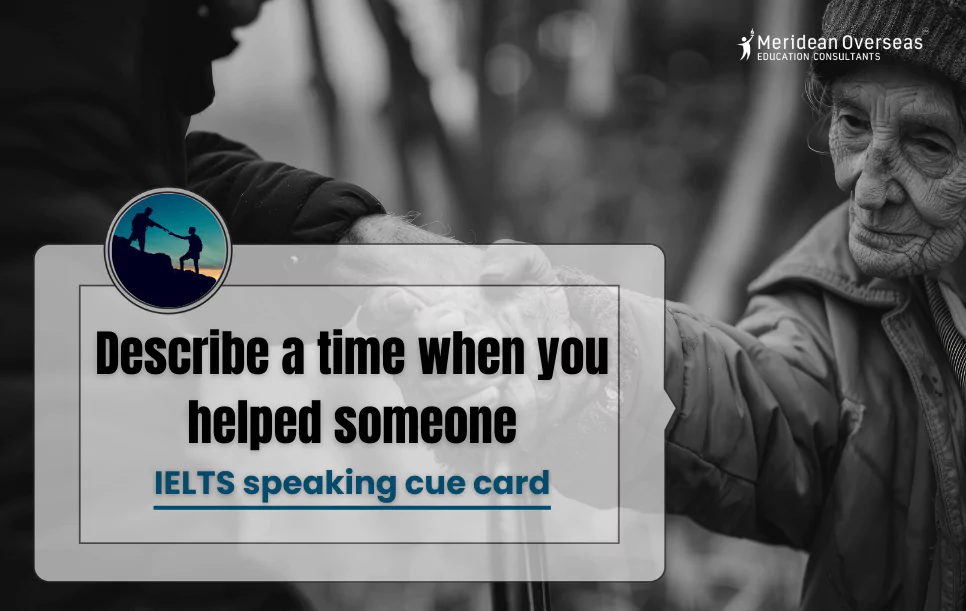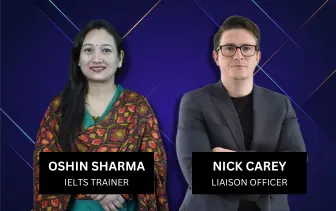
Announcements

Announcements

Meridean Overseas
29 March 2024
7.8k
The four components of the IELTS are writing, speaking, listening, and reading. You have two and a half hours total to finish it. Thus, you must time every segment. There are fifteen minutes allotted for the speaking portion. To cover everything you want to in 11–14 minutes, you will need to practise a lot.
Although, we must inform you that it is not as easy as you think. There are many topics that provide no content at all. "Describe a situation or a time when you helped someone" is one of the Cue Card topics that we will be covering for you today. So, let’s begin with the blog.
Table of Contents
People get immensely satisfied when they help others. I never pass up the opportunity to assist those in need. I enjoy supporting them in any manner that I can. I appreciate that you gave me this cue card topic. Today, I'll be talking about a time when I donated blood.

The incident I'm referring to here was when I helped out at a blood donation camp run by my Rotary club, Jaipur. They ran an advertisement in the local newspaper to attract people who were willing to donate blood since they were in need of help. I was delighted to comply, as I had always desired to be a part of something that would benefit people during a health emergency.
I gave blood at the blood donation camp as a volunteer and encouraged others to do the same. After collecting this blood, the club sends it to our town's government hospital. In short, I made a difference for at least one individual who may require blood in the future.
Moreover, I was one of the rare donors with blood type O negative. In an emergency, it might be quite challenging to locate someone with this rare blood type. Since I had a good haemoglobin level, I donated two bags of blood to our town's government hospital's blood bank.
The Club members really appreciated me for doing this wonderful job. They also arranged the donors' breakfast and gave us the certificates.
It made me feel better to know that I was able to assist those who might be in critical need of blood. I was happy to contribute to someone's assistance. I've also made a commitment to give blood annually.
Well, I was very happy to help someone who needed blood. I tried motivating other people to donate their blood, as it has dual benefits for both the donor and the receiver.
Read more: IELTS Cue Card: Describe a time when you needed to use your imagination
We all live in societies rooted in prehistory; therefore, to grow socially and personally, we depend on the support of others. Things would have been considerably more difficult if there had been no support system in place during difficult times, natural disasters, or other calamities.
On my way back from my coaching around 15 days ago, I saw an injured woman with her six-month-old child. She had a milk packet in her hands and was holding a baby. She seemed to be very worried as it was hard for her to carry her baby with that milk packet in another injured hand. At first, she was a little hesitant by my abrupt appearance. Although, being careful while interacting with strangers makes sense. I would act in the same manner if I were in her place. But soon, she realised that it was safe to let me hold her baby at that point. So, I dropped her to her house, and she thanked me for the help.
When we arrived, she gave me a cup of coffee and invited me to stay for dinner, but I politely declined since I had to get home.
I had never felt anything like the happiness I felt at that precise moment while seeing the blurry eyes of that woman when I offered her help.
Last but not least, I feel calmer and more positive after doing a selfless deed. For the sake of our shared prosperity, I hope everyone will regularly help one another somehow.
Also, Read: IELTS Cue Card: Describe an Interesting Conversation that you had
Embark and excel in your study abroad journey with our expert team!

Question: How do people usually help each other?
Answer: In my opinion, it is the goodwill present in most human spirits. We understand how good it feels to get assistance from others when we're in need, so we want to help others in a similar manner. It's also about the fulfilment we get from lending a helpful hand to others.
Question: Do you think it’s important to help people who need help?
Answer: In order to create a compassionate and encouraging community where everyone has the chance to prosper, it is imperative that we assist those in need.
Question: How do you feel after you have helped someone?
Answer: Assisting others increases empathy and encourages social ties while bringing a sense of contentment and satisfaction. Ignoring society's interdependence and self-centeredness leads to discord; cultivating a compassionate culture is advantageous to all, resulting in a more cohesive and encouraging community.
Question: Many people only look out for themselves and never think about helping others. What do you think of this attitude?
Answer: In my opinion, it is incorrect. I know it's not a very big deal, but it's a depressing picture of the modern world, at least in big cities. While I acknowledge that not everyone has gotten as self-centred as they have in recent years, a sizable portion of people have been completely selfish. People are in such a rush to get rich, land a better career, or get into the best schools that they hardly notice those who are less fortunate. People could see others' needs and respond appropriately if they were less preoccupied with their own concerns. I sincerely hope so.
Question: What is the most important way for a country to help visitors?
Answer: Language aid is arguably the most common form of support that immigrants need. On the streets, I've also seen a few foreigners who are getting in trouble because of language barriers. Giving them information is another common way to help since foreigners frequently use their maps to try to find a popular tourist destination. It's been a wonderful chance to speak with someone from a different country.
Question: What are the differences between help from friends and help from family?
Answer: When friends lend us a hand, we feel more pressure to pay them back eventually, but we don't feel the same way about family members. We take for granted our families' support, which may be both advantageous and disadvantageous.
Question: How do people in your community help one another?
Answer: People in my community support one another in a variety of ways. This includes lending a hand at neighbourhood watch initiatives, supporting small businesses in the area, and volunteering at community events. When someone is in need, such as after a natural disaster or personal tragedy, there's a sense of solidarity, and people are willing to help with resources, time, and emotional support. Informal gestures of generosity are also frequent, such as watching over one other's kids or assisting elderly neighbours.
Question: How can charitable organisations help people?
Answer: Charitable organisations assist people in a variety of ways. They aid by giving money or imparting knowledge that enables people to earn a livelihood. Some organisations also distribute food items or basic things which are required, like clothes and books. Apart from this, a few organisations also assist in health emergencies by donating blood, medicines, and sanitary items.
Question: How can we encourage children to help others?
Answer: By leading an example, we may inspire children to help others. When they witness these behaviours in others, they are more likely to imitate adults who show them compassion and support. Furthermore, encouraging a child to help others reinforces that behaviour. Children can be motivated by including helpful duties in their daily routine, such as housework or community service, and by explaining how their assistance benefits other people.
Question: Should parents teach helping others to their children?
Answer: Absolutely, individuals from all walks of life should instil kindness in their children. If children grow up with the habit of helping others, they will mature into responsible adults, and this fosters a positive community in which members look to one another for unwavering support in the event of unforeseen circumstances.
Question: Should schools be responsible for teaching students how to cooperate?
Answer: I think it's important for schools to take responsibility for educating kids about cooperation and helping each other. Regrettably, increased competitiveness in schools is having the opposite effect, and many students find it difficult to work cooperatively as adults.
Question: Do you think people are less willing to help others these days compared to the past?
Answer: Yes, because of intense rivalry and rapidly rising competition, people in the modern era are still overly preoccupied with their employment. They, therefore, find it difficult to help others out of their busy schedule.
Also, Read: IELTS Cue Card: Describe a time you were very busy
Although the speaking portion is allotted 15 minutes, it has the same weight as the other sections. Therefore, to be able to handle this area, you will need to practise a lot. This section contains open-ended questions, such as "Describe a time when you helped someone." You must address the following four key questions in order to respond to this one: "Who was the person?" and "What was the situation?" How did you assist them? What emotions did you experience afterwards? Once you've explained these, the examiner will ask you a few follow-up questions. Ensure you utilise most of your time and answer properly and confidently.
We hope you know how to cue card questions in your IELTS speaking test. But, if you want to get further details or would like to prepare for IELTS, you can contact our expert counsellors at Meridean Overseas Education Consultants (MOEC). You can also take free online counselling through our website. Our expert counsellors will provide you with the best support and guidance you need for admission and visa. In addition, they will help you shortlist the universities according to your profile. For more information or any queries, contact application02@meridean.org or 1800-1230-00011.
Boost your IELTS score with effective practice using these sample papers.
Get Your Free Guide

Contact MOEC Experts for Study Abroad Guidance!
By using our site, you agree to our use of cookies.

Hurry up before admissions close.

Contact MOEC Experts for Study Abroad Guidance!
